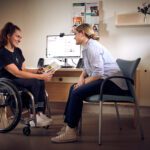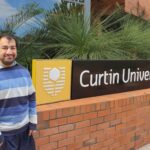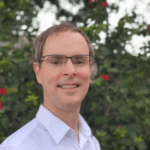Josephine Zimama is a second year health sciences student with a passion for health promotion. Motivated by the belief that “education is the key”, the determined student and former refugee has overcome negative stereotypes and worked hard to attend University. Whether she decides to work in Australia or Africa, Josephine desires to improve the health of people wherever she goes.
Why did you choose to study health sciences?
Well, it just clicked with me when I was young and went to hospitals; I knew that’s what I wanted to do. I’ve always wanted to help people and I do have a lot of health professionals and business people in my family. I’ve had some experience in health, because my uncle in Africa is a doctor and when I go back to Africa I do field work with him. I wanted to get into something promotional so I could help him in the long run.
I would like to do some service work for a year or six months, but my main objective is to promote health and healthy lifestyles. I’m definitely focused on finding work in Australia in the near future, but if I do get a job that allows me to travel, that would be an amazing opportunity.
I think some people forget their purpose and motivation in this country. For me, that’s never been an option: education has always been my primary goal. As my father used to say, “education is the key”, and honestly I agree: if it wasn’t for education I wouldn’t know about my people’s struggle and what I can do to help. That’s why I’m studying a Bachelor of Health Sciences at Curtin, because I believe health is life and with this knowledge I hope to help improve the health of many immigrants and refugees like myself.
Can you describe what it felt like being a refugee?
My life has always been an unstable one. I guess some people are just used to uncertainty and I just happen to be one of them. Don’t get me wrong, I believe that with every experience I’ve been blessed enough to learn and grow. Growing up in Australia as a refugee, I never realised how much harder I had to work to achieve, until I made it to University.
I think a lot of refugees are in denial. If you meet a refugee, they will probably say: “Oh no, I’m a migrant and had a choice to come.” For me, growing up, I was very defensive about that thing. I mean, in early primary [school], I said: “My dad got a job here – that’s why we moved here.” But the truth is: my country was in war. My parents have always been refugees. They moved to one country and they had a war. They moved to another country and they had another war. I wasn’t even born in my home place.
For me, growing up as a refugee was a big deal because I had to know why I was here. It wasn’t just because we chose to be here – we didn’t really have an option but to be here. This was a place where I could develop myself. The quicker I accepted that I was a refugee, the better I could actually fix up my life and hope that my children could have a better life. I never actually experienced it, but my parents’ trauma did affect us. Moving around and everything is not easy.
The reason why I said it was hard getting into uni is because when I went through high school, I didn’t realise how difficult it was because there’s that stereotype [of refugees]. When you wanted to do something, people were like: “Oh, maybe you should do this instead”, which was very frustrating for me because that’s when I realised that there is a stereotype that I have to go against and I have to work harder. Although I think my English is pretty good, I realise that I’m battling when I submit assignments because I do have a different mindset about how things should be set out.
Did your father’s belief that “education is the key” influence you heavily?
Definitely. You know how people say if your parents are educated, then you have a greater ability to improve yourself? My father was not only a refugee – he was orphaned at a young age and he was a village man. Then he got a scholarship from one of the Catholic institutions in my country and started building up on his education. From there, he started having opportunities and moved to different parts of Africa. Very soon he got his degree and he started helping others and teaching them.
I’m privileged to have an educated father because it gave me that foundation to know that education is the key. I feel like the more education I become, the more I understand what’s happening around me. I agree that education is the key because it changes your life. [My father went from] having nothing to being able to travel around European and Asian countries. He’s been everywhere and that’s because of education.
If you could give anybody one piece of advice, what would it be?
I know this is going to sound cliché, but it’s definitely what I believe: don’t listen to anybody’s negative comments. Negative comments can literally come from anybody. It can come from your own family members and it can come from your partner. If you have a goal and it might seem crazy, just go for it!
My own individual family members have told me that I couldn’t do stuff, but I’ve proved them wrong. It’s just having the passion to do what you want to do and to actually work hard. Even though everyone has a dream, you’re not going to get it. Even if you’re actually able to get it, you have to work hard, put in the effort and look for ways to get there.
What’s been your greatest struggle and what’s been your greatest achievement?
My greatest struggle has been the instability of not knowing where I’m going to end up. When I was in high school, my parents were talking about moving back to Africa. When you’re a child, as part of African culture, you just follow what your parents say, but now that I’m an adult it’s for me to decide. I definitely want to go back home – maybe not to my home country, but maybe to my continent.
My greatest achievement was that I was my high school’s valedictorian. The reason why it’s my greatest achievement is because I was not only the first Sudanese, but I was the first African to get that opportunity to represent us. For me, it was a huge deal, because I could make others believe that they could do it. That school was very diverse, but not many people would step up for roles like that, because they thought they couldn’t get it because they were refugees or African. I know that a lot of kids are running for it [now]. It’s like, if one person does it, everyone else thinks they can do it.



